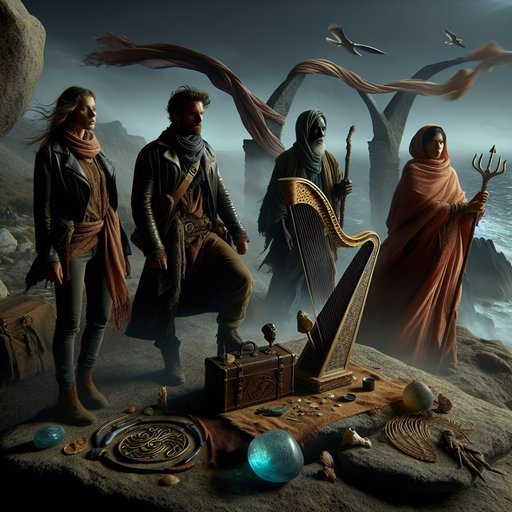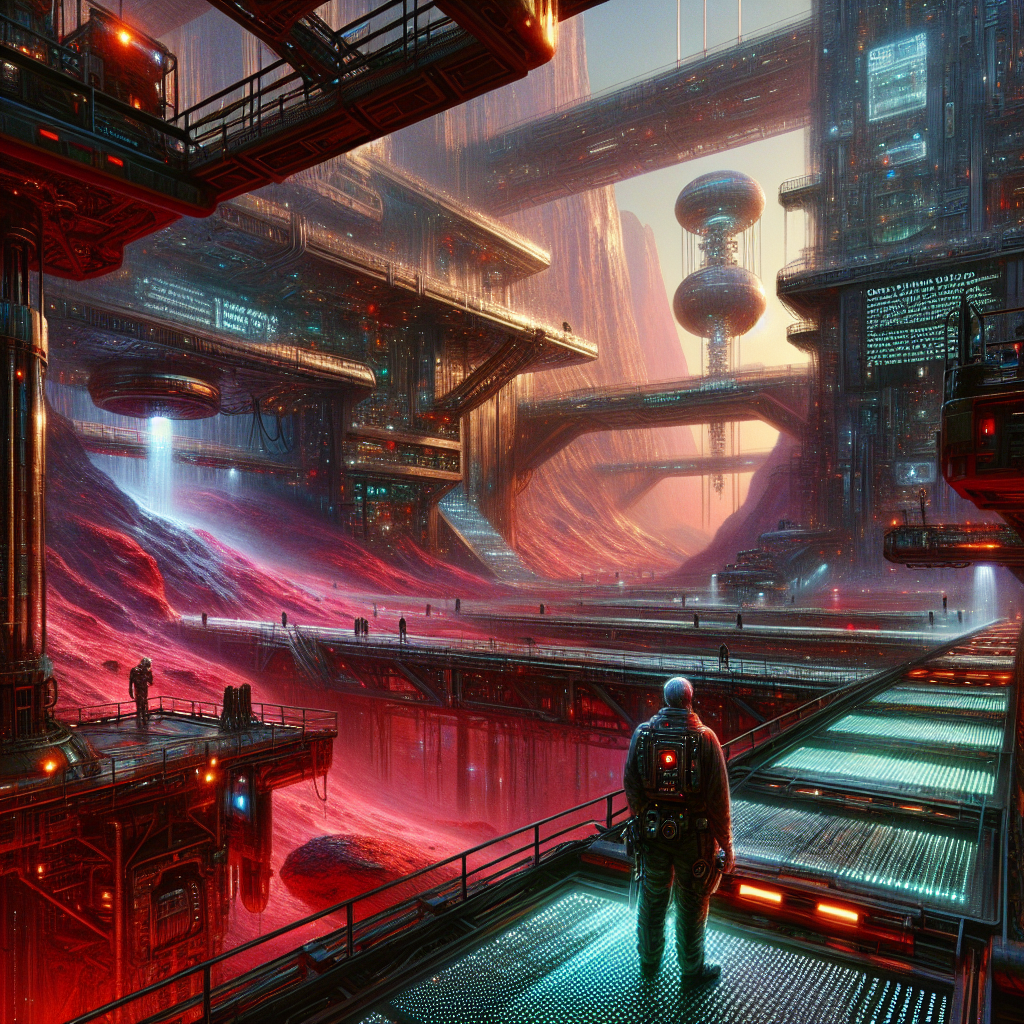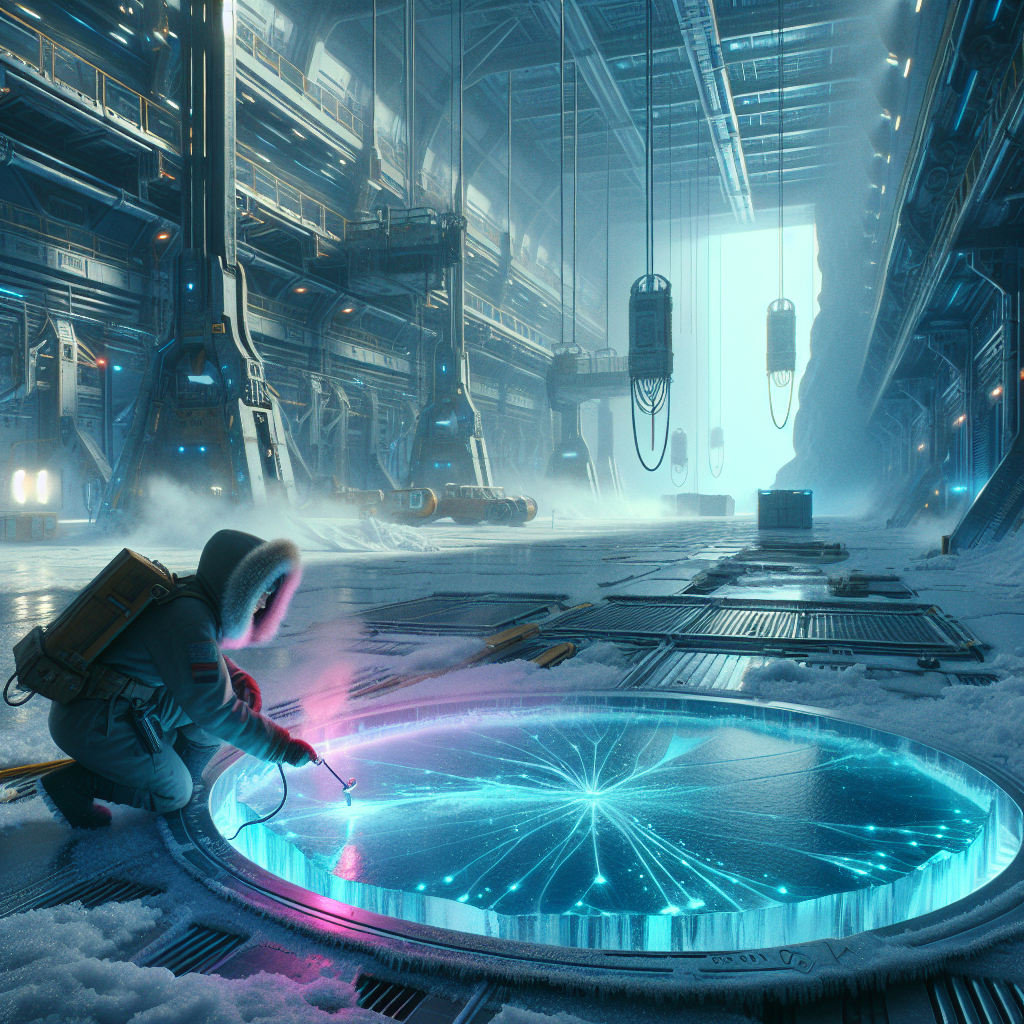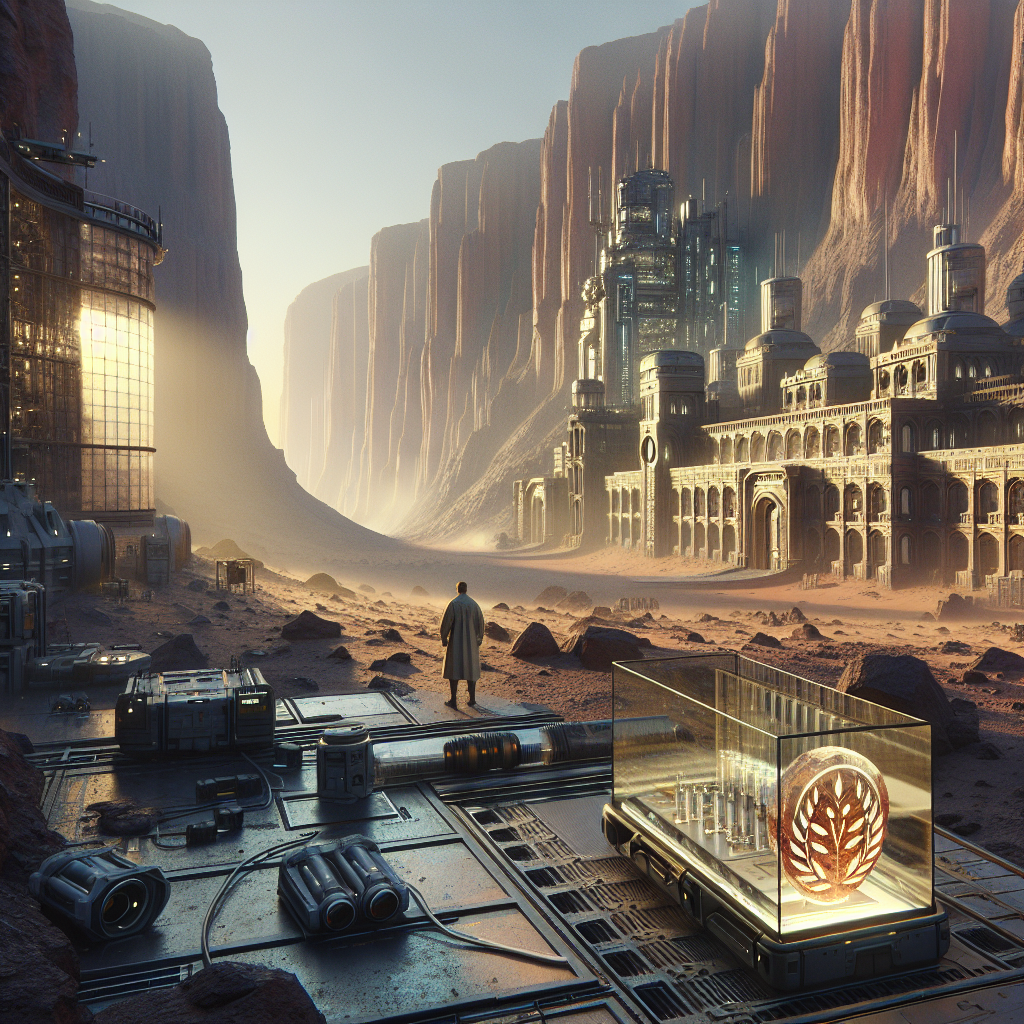CHAPTER 7 - Quieting the Mother in the Well
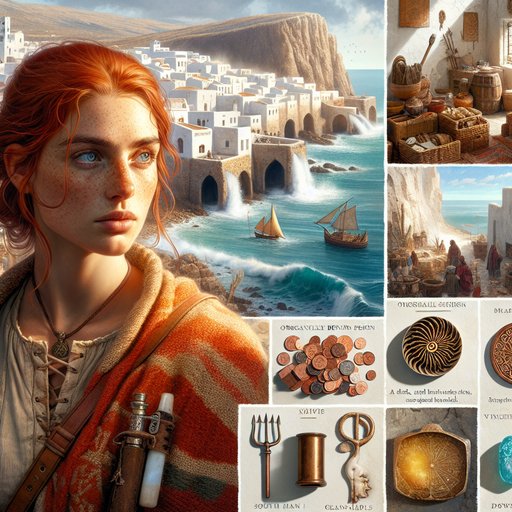
Barbra Dender—red-haired, freckled, self-reliant, and perpetually restless—flies to Socotra to chase a rumor about the Dragon’s Blood Covenant and its “singing” places where wind and stone speak to one another. In Hadibu she rents a whitewashed room, roams markets and highlands, and learns to listen: to the hum of dragon’s blood trees, to the note of shattered glass fused into rock, and to the locals’ careful silence. A copper coin and a vial of resin left at her door point her toward a blowhole that sings near Qalansiyah, and an elder’s hushed hint about a secret guarded by families confirms she is close. Inside a sea cave she discovers a blue glass shard etched with a trident-spiral, but her first attempt to pry answers from the stone is stopped by unseen guardians, and she is forced to slow down and earn trust. After rooftop tea with a teacher, drum rhythms reframe her thinking; in Homhil’s plateau she finds a limestone lip whose pinholes accept her shard, tuning the wind and revealing a resin-sealed niche with palm-leaf diagrams. Saba, a market woman, and Adem, a wary boy, test her patience and integrity, guiding her toward a fog-drinking grove where she learns the trident-spiral is a wind compass. A coral medallion at Detwah turns out to be a decoy meant to trip the impatient, and Saba sends her back to first principles: coin, resin, shard, breath. Following subtler tones mapped to rooftop drumbeats, Barbra locates a stringless wind-harp grown into a living tree above the Momi cliffs, nearly pitches into the void, and is rescued by Adem and Rashid, the reluctant boatman. Together they wake the instrument with a triad of breaths, trigger the Covenant’s network, and draw guardians to the ridge. Barbra reads enough of the palm-leaf to glimpse the true target: a Mother Harp concealed in a sinkhole beyond Diksam. The stern elder declares the brass trident-spiral key quiets rather than opens, and Saba engineers a decoy to protect the path, even as a stranger steps from the hot wind with an iron mirror-key and claims to carry a letter from the grandmother who raised Barbra. On a wind-cut arch, a test of listening earns Barbra a chance to proceed under watch. In the final journey, Barbra descends to the “Mother in the Well” with Saba, Adem, Rashid, the stern elder, and the stranger. Using resin-smeared coin, blue shard, shell mouthpiece, and Rashid’s fishbone whistle, she threads a hush-tone while the stranger angles the iron mirror to bend light into sound. The Mother reveals a niche with a small, resin-stoppered shard and a folded letter from her grandmother, affirming a long-ago pact of trust between family and Covenant. Barbra returns the brass key, helps reseal the chamber, and leaves the secret where it belongs. The Covenant grants her a sanctioned relic for her glass cabinet, and she departs Socotra relieved, the mystery intact and her promise kept.
The wind off Diksam’s stone cut our lantern light into ribbons as the stranger stepped from the dark with an iron mirror-key cupped in his hand like a cool ember. I felt the leather of my jacket pull across my shoulders as I turned, breath catching, hair licking at my cheeks, the scent of resin and dust mixing like dry perfume. He held up a parcel no bigger than my palm and said my name softly, not as a challenge, but as if we were already past introductions. Behind me, Saba’s shard glinted a warning, and the stern elder’s staff found stone with a hollow knock.
I tightened my fingers around the blue glass shard, the brass trident-spiral key cold against my other palm, my jeans gritted at the knees and my blue-and-white Asics tacky with dust. “I carry a letter,” the stranger said, voice level, “from the woman who taught you to do things yourself.” He smelled like salt dried into cloth and frankincense smoke, and when Saba demanded proof, he unwrapped the paper and read a line that no one else could have known: that I used to stand on a kitchen chair to see the freckles I disliked in the mirror, and that I never needed makeup to be who I already was. He added another, and it cinched tight around my ribs—my grandmother’s phrase for the two little dents in my back: commas where a brave sentence pauses. The stern elder’s eyes flicked to me; even Adem, who watched me as if waiting for me to fail, shifted his stance.
The stranger gave a small bow and said, “Hani,” as if naming himself would neither smooth nor sharpen the blades that lay between us. The monsoon was not yet upon us, but the night wind rolled heavy with a heat that made the rock smell iron-rich, and time felt narrowed by it. Saba touched my elbow and the elder nodded once, a permission that was more conditional than any contract I’d signed. Hani spoke of a crossing from Mahra by dhow, of a trader who owed Saba’s aunt a debt that could be paid only with a letter entrusted years ago, waiting for a name to ripen.
The iron mirror-key, he said, was old and practical—made to bend light into shadow and sound, a tool for quieting what should not cry out to greedy ears. The map from the Daughter Harp, the palm-leaf diagrams, the triad of breaths: all of it pointed to one path, and the air itself said we had to take it now or be beaten blind by the red rain. We walked, five figures and a secret, along a ridge that combed the star-thick sky. Dragon’s blood trees leaned like guardians themselves, their inverted umbrellas stacked with old cuts that had bled resin and healed into pale scars.
My legs carried me easily; I’ve walked my way through grief and across cities and over moors no one photographs, and what Homhil and Momi taught me was in my calves now, steady and ready. Rashid moved ahead with rope over his shoulder, humming a brittle line that made the wind show its teeth, while Adem padded at my side, saying nothing but measuring each step. When the ground fell away, it did so suddenly—an ink-black mouth ringed with pale limestone: the Mother in the Well. The rim was pocked with old footsteps made permanent by salt; a goat’s skull lay like a warning, eye sockets cut to the dark.
We anchored three ropes and tested them until even the stern elder allowed himself a grunted acceptance, and then we went down in pairs, feet searching for shallow holds worn by generations of hush-keepers. The air cooled as the sky narrowed, and the Well breathed: a slow, ancestral exhale that made the hairs on my forearms lift. In the first chamber, light pooled in marble-shaped pockets where quartz had been polished by unseen tongues, and when I breathed through the shell mouthpiece, a thin gold line of sound replied from deeper in. We followed it, and the bone-white belly of the Mother revealed itself—stone ribs softened by centuries, glass fused into ledges like a choir waiting for its conductor.
No strings, only wind, bottles, and the architecture of grace laid down and disguised by floods and time. The trident-spiral motif trembled in tiny scratches where hands had tested alignments; resin sealed hairline fissures like varnish on an old violin. I could feel the old urgency that had followed me into the sea cave and nearly made me pry it open with my own stubbornness, but Saba’s earlier warning rode my shoulder: the wind exacts a price. The brass trident-spiral key warmed in my palm, as if it remembered its purpose was to quiet a song too loud, not to call a storm.
Hani knelt, set the iron mirror on his knee, and caught the faintest sliver of moonlight, angling it until the dim beam found a notch like a listening ear high on the wall. We began the triad as we had on the cliff: three breaths braided with care. Rashid’s fishbone whistle laid a bottom note that felt like a line pulled taut between distant boats, while my shell mouthpiece lofted a thread that wanted to rise and spill, and the Mother’s own currents took Saba’s shard and coaxed it to sing. I smeared a thimble of resin across the copper coin and set it on a carved rosette where the palm-leaf diagrams suggested, the tackiness stabilizing the coin so it wouldn’t chatter.
The brass key turned in a slot masked as a fossil, and with the slow rotation a hush spread like oil across water, drawing the tones into a single, almost-silent chord that made the glass chorus flicker once, then still. Hani shifted the mirror and the beam slid onto a row of fused bottles as if it had been finding them in the dark for generations; a soft violet shimmer pooled along the glass necks and sank into the stone. I watched for impatience the way I’d trained myself to watch for loose rock; I watched it, and then I let it move on. The chord deepened without growing louder, like a promise fulfilled in lower registers, and a seam opened, lacquered by resin the color of dried blood.
Adem touched my sleeve, eyes wide but face composed, as a small niche presented itself at chest height, desire wrapped in silence. Inside lay a palm-leaf twist bound with a hair of goatskin and a blue glass stop the size of a spindle whorl, its cork sealed with dragon’s blood resin and its face etched with the trident-spiral and a tiny comma. Saba did not reach in; neither did the elder. Their restraint matched my own pulse, and when I looked at Hani he flicked his eyes to the palm-leaf twist.
I lifted it carefully, felt the old fibers rasp my fingertips, and tucked it into my jacket; then I lifted the stop and turned it toward the mirror, and the etched comma winked once as if acknowledging something private. A folded paper rode beneath the stop, dry as tinder, and I knew it before I read it: my grandmother’s script, tidy, slanted, unflourished. “If you are holding this,” it began, “then the wind has judged that you can listen longer than you can speak, and that you have found people worth trusting enough to leave something beautiful unshared.” I did not cry; I smiled into the dark because my grandmother had always taught me to save tears for when they were needed. We resealed the niche with the same resin we had softened, the brass key turned back to its original quiet angle, and Saba drew a new line of lacquer across the seam with a care that could have belonged to a bookbinder or a violin maker.
The Mother sighed once, a release rather than a warning, and the chord loosened into the Well’s normal breath, as if a great animal had gone to sleep again. Far above, the wind shifted, and a rust-colored mist flurried down the shaft, stippling the stone like the first brushstrokes of a painter who knew when to stop. The stern elder set his palm flat on the stone and murmured a brittle blessing, then looked to me as if asking whether I understood what I was taking when I slid the blue stop and the letter into my inner pocket. I nodded and placed the brass trident-spiral key back into his hand; it belonged here, not on my shelf.
The climb out was slower, not because of fatigue but because we knew we were leaving a heart beating at a speed we could not schedule. Rashid tested each knot with the caution of someone who had once trusted a rope that lied, and Adem scrambled ahead, anchoring us with boyish efficiency. At the rim the air was warmer and smelled faintly of iron and sap, and when we looked back we saw no sign we had opened anything at all. That was the point: mystery intact, map misdirected, decoy bright elsewhere, the true path treated with the kind of respect I had learned in childhood when I was allowed to work a lock only after I’d watched it be opened slowly.
Saba threaded her arm through mine for the smallest moment, a gesture neither maternal nor martial, just human. Hadibu received us with a gray dawn that made the whitewash glow, and I slept a few hours on the thin mattress and woke to the sound of a market returning to itself. I showered the canyon dust from my hair and laced my Asics, jeans still stiff with salt, and sat on the bed to read my grandmother’s letter with both hands. She wrote of a young Socotri woman she had once sheltered in Aden, of songs that traveled better in silence, of men who led for power and women who led for patience.
She wrote, too, of me: how I fell in and out of love like summer storms over moorland and how I was always braver than my freckles allowed me to believe. “Keep your pumps for dancing and your boots for walking,” one line said, and I laughed aloud because my Louboutins had not seen sand and never would. In the afternoon we took tea on a rooftop with the teacher who had translated my first scrap, the sky so clear it felt newly minted. I put the blue glass stop on the table—not the brass key, not a map, only the small sanctioned relic—and Saba set her shard beside it, and the two pieces leaned into each other as if remembering a song they both knew.
Rashid showed Adem how to wrap and store a line properly so that it could never again be pulled free by mistake, and the boy listened like someone who had learned that patience could save lives. We did not speak of the Mother by name; we spoke of weather and boats and a stinging jellyfish that had come inshore early, and I told a story about being six and thinking freckles were a kind of rust that could be sanded off. Before sunset I sealed my grandmother’s letter in a plastic sleeve, because some things are worth protecting twice. On my last morning I chose a floral denim jacket for the flight, tucked the blue stop into the padded pouch where I carried my passport, and walked to the edge of town to look back at the mountains that had taught me to listen differently.
The dragon’s blood trees made their improbable umbrellas against the sky, and I thought of the families who guarded the Covenant not to hoard but to keep balance, a word my grandmother liked better than truth. When the plane lifted, the island receded into a geometry of green crowns and chalky flats, and I felt that gentle ache I always feel when I leave a place that has both tested and trusted me. I pictured my glass cabinet at home, the shelves already busy with stories, and imagined the blue stop sitting among them, not as a boast but as a promise kept. Relief came like the first breath after a long dive: easy and warm, with the knowledge that some songs are only beautiful because they are not sung to everyone.





































